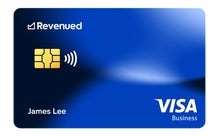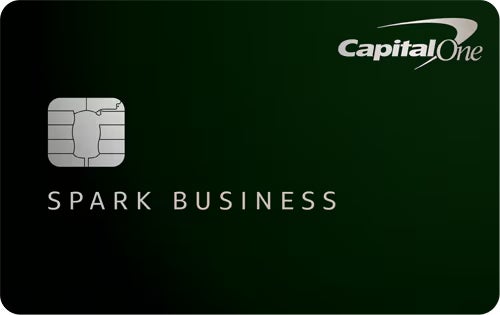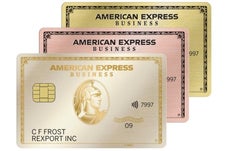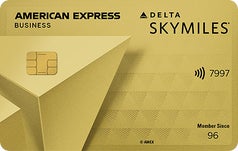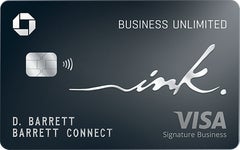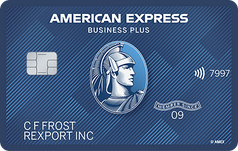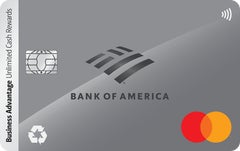Revenued Business Card review: A fit for business owners with subpar credit?
This unique option for business funding can give subprime cardholders an alternative to secured cards
The Bankrate promise
At Bankrate we strive to help you make smarter financial decisions. While we adhere to strict , this post may contain references to products from our partners. Here's an explanation for .
Snapshot
2.7
Bottom line
If you have fair credit but need access to funding for your small business, there's a lot to love with the Revenued Business card. But its mandatory finance charges may prove costly.
Best for Fair Credit
Intro offer
N/A
Rewards Rate
N/A
Annual fee
None
Regular APR
Factor Based
2.7
Bankrate score
Card Details
Remove a card to add another to compare
Remove a card to add another to compare
Revenued Business Card Overview
Combining a prepaid business card with a flexible spending line, the Revenued Business Card + Flex Line balances some of the best features of business rewards cards with the convenience and flexibility of business loans or a line of credit.
Because approvals are based on your business revenue and banking activity, the Revenued Flex Line makes capital available to business owners even if they have less-than-ideal personal or business credit scores. Revenued also extends spending lines in exchange for a portion of your future business revenue, so you may have access to more capital than you’d get with a typical subprime or secured card credit limit.
However, this financing model comes with risks. Not only is it impossible to avoid finance charges in the same way you can when using a traditional credit card’s grace period or a 0 percent introductory APR, but you also risk not having enough funds in your account to cover your automatic daily finance charges. That will result in you being charged a fee.
-
Rewards
- This card does not offer rewards.
Expert Appraisal: Weak
See our expert analysis -
Rates and fees
- Annual fee: $0
- Flex Line Charge: 10 percent to 50 percent of amount borrowed
- Regular APR: Factor Based
- Low balance fee: $35 per day
Expert Appraisal: Typical
See our expert analysis -
Other cardholder perks
- Quick application process
- Flex Line financing
- No hard credit inquiry
Expert Appraisal: Typical
See our expert analysis
What are the pros and cons?
Pros
-
Quick access to financing with limited documentation puts money in your hands when you need it.
-
If you can present positive cash flow for your profitable business, you’re certain to get access to funding even with bad credit.
Cons
-
High factor rates can make repayment a hefty task compared to what you might have to pay with credit card APRs in the short term.
-
Your factor rate makes it difficult to plan repayment ahead of time.
Flex Line vs. Traditional APR Spending Example
The biggest difference between the Revenued Business Card's Flex Line and a traditional interest rate is how repayment is determined. A factor rate is different from an interest rate and is presented to cardholders as a decimal rather than a percentage. Rates typically range between 1.1 and 1.5, which is essentially a 10 percent to 50 percent charge for access to funds. For example, if you make a $5,000 purchase with a factor rate of 1.1, then you’ll owe $5,000, plus $500 in finance charges.The following tables show how much interest you’d face if you paid off a $1,000 balance on a credit card (based on Bankrate’s credit card payoff calculator, with an APR around the national average of 20 percent) and how this compares to the finance charges you’d face after making a $1,000 purchase with the Revenued Business Card + Flex Line given different payback terms.
Interest charges on $1,000 credit card balance (19 percent APR):
| 1 month | 2 months | 3 months | 12 months | 36 months |
|---|---|---|---|---|
| ~$15 | ~$23 | ~$31 | ~$105 | ~$319 |
Finance charges on $1,000 Revenued Card + Flex Line purchase:
| Factor rate | 30-day payback term | 60-day payback term | 90-day payback term | 1-year payback term | 3-year payback term |
|---|---|---|---|---|---|
| 1.1 | $100(~$36 / day) | $100(~$18 / day) | $100(~$12 / day) | $100(~$3 / day) | $100(~$1 / day) |
| 1.3 | $300(~$43 / day) | $300(~$36 / day) | $300(~$14 / day) | $300(~$3 / day) | $300(~$1 / day) |
As you can see, traditional credit card interest charges may prove less expensive than the Flex Line finance charges if you only need to carry a balance short term. Meanwhile, factor rate-based finance charges could save you money if you need to stretch repayment out over several months.
Why you might want the Revenued Business Card
The Revenued Business Card + Flex Line could be a way for business owners — especially those with limited or damaged personal credit — to separate their business spending from their personal spending. Even better, the card has a quick and easy application process that allows cardholders to access these funds sooner than other cards.
Benefits: Quick application process and no hard inquiry
Once your Revenued Business Card + Flex Line application is reviewed, you’ll get an approval decision within an hour. You also aren’t required to move forward with opening an account until you see your spending limit and factor rate. This is a rare perk among any credit card and makes it much easier to weigh your options in a complex business funding market.
Since your funding decision is based on revenue and cash flow — not your credit score — the Revenued Business Card + Flex Line is a great fit for cardholders with a limited or less-than-ideal credit history.
The Revenued application also does not require a hard credit inquiry, which keeps your credit score from temporarily dropping when you apply, as it would if you applied for a typical business card. This is a strong benefit if you already have fair or average credit and want to protect or build your score.
Credit limit: Spending limit increases with your revenue
How much funding you’re eligible for is based on your current business savings, income, cash flow and debt, so your spending line evolves with them. This means as your business grows, so too will your Flex Line.
This is a great perk for business owners who are seeing rapid growth and continuously need more funding for their operations, but may not qualify for a large business loan or credit limit on a traditional credit card. It can also come in handy if your business revenue fluctuates throughout the year.
Why you might not want the Revenued Business Card
One of this card’s best traits is its low entry barrier when it comes to your credit score — a big perk if you have fair credit or limited credit history and need access to business funding. However, beyond this convenience, there are few perks on this card.
Rates: Flex Line too expensive to use
On the surface, the card can seem pretty affordable. There’s no annual fee for this card, making it an accessible option for business owners who don’t have a lump sum of cash to tie up in fees. The Revenued Business Card also doesn’t come with a definitive APR since it is factor-based, so you may not have to worry about compounding interest charges.
You could be placed in a daily, weekly, monthly or yearly repayment plan. These plans vary from one business to the next, but as underwriters review your application, they will determine your repayment period at the same time they determine your factor rate and Flex Line limit.
However, to use your Flex Line, you’ll have to pay finance charges based on your factor rate, and funds are automatically deducted from your account based on your rate and payback term. You’ll also face fees if you don’t have enough money in your account and your payment bounces ($35 for each day it’s assessed).
Which financing method works better for you will depend on the type of business you have and how successful it is. You could be placed in a daily, weekly, monthly or yearly repayment plan. These plans vary from one business to the next, but as underwriters review your application, they will determine your repayment period at the same time they determine your factor rate and Flex Line limit.
Benefits: Scarce for a business card
While the Revenued Business Card has great benefits for beginners, the long-term value is limited. Most of the card’s benefits are centered around the application and the Flex Line feature, along with the standard online dashboard and 24/7 customer service.
For business owners building their credit, this could be enough. However, for business owners who are looking for a card that includes better benefits, this card can be severely lacking. If you have good to excellent credit, it may be better to look at cards that offer business product discounts or travel credits.
Best cards to pair with the Revenued Business Card
It might be a good idea to pair this card with a no-annual-fee card that also earns rewards on purchases. While the Revenued Business card can help you access funding with a damaged or limited credit history, it’s not the most practical long-term credit-building option since you can’t avoid finance charges. A no-annual-fee card may prove less expensive and more efficient at building credit over time.
How the Revenued Business Card compares to other business cards
It’s hard to compare the Revenued Business Card + Flex Line because of its unique funding and payback structure, and it shares very few features with traditional business cards.
If you’re looking for a new business card, and you have fair or average credit, the Revenued Business Card + Flex Line may be one of your only options. But if you’re close to a good credit score, consider these alternatives:

Annual fee
Intro offer
Rewards rate
Recommended Credit Score
A FICO score/credit score is used to represent the creditworthiness of a person and may be one indicator to the credit type you are eligible for. However, credit score alone does not guarantee or imply approval for any financial product.

Annual fee
Intro offer
Earn $750 bonus cash back after you spend $6,000 on purchases in the first 3 months from account opening.
Rewards rate
Earn unlimited 1.5% cash back on every purchase made for your business.
Recommended Credit Score
A FICO score/credit score is used to represent the creditworthiness of a person and may be one indicator to the credit type you are eligible for. However, credit score alone does not guarantee or imply approval for any financial product.

Annual fee
Intro offer
Rewards rate
1.5% unlimited cashback with no annual fee.
Recommended Credit Score
A FICO score/credit score is used to represent the creditworthiness of a person and may be one indicator to the credit type you are eligible for. However, credit score alone does not guarantee or imply approval for any financial product.
Is the Revenued Business Card right for me?
If you find that your business requires a little extra cash occasionally, the Revenued Business Card could be a good fit for you, as well as if you:
Need more flexibility financing your business.
Have bad or little credit history.
Would benefit from this card's unique Flex Line program, allowing you to finance sudden expenses without taking out a loan.
Alternative picks
If you have a fair credit score or no credit history and can’t qualify for traditional business cards or a low-interest business loan, consider these other card options.
How we rated this card
Our proprietary card rating system takes into account a mix of factors when scoring business credit cards, including each card’s rewards rate, estimated annual earnings, welcome bonus value, APR, fees, perks and more.
We analyzed over 50 of the most popular business credit cards and scored each based on how its key features stacked up compared to those of other cards in its category.
Here are some of the key factors that gave this card its score:
The Bank of America content in this post was last updated on June 17, 2025.
*The information about the Capital on Tap Business Credit Card, Bank of America® Business Advantage Customized Cash Rewards Mastercard and Brex Card has been collected independently by Bankrate.com. The card details have not been reviewed or approved by the card issuer.
* See the online application for details about terms and conditions for these offers. Every reasonable effort has been made to maintain accurate information. However all credit card information is presented without warranty. After you click on the offer you desire you will be directed to the credit card issuer's web site where you can review the terms and conditions for your selected offer.
Editorial Disclosure: Opinions expressed here are the author's alone, and have not been reviewed or approved by any advertiser. The information, including card rates and fees, is accurate as of the publish date. All products or services are presented without warranty. Check the bank’s website for the most current information.
